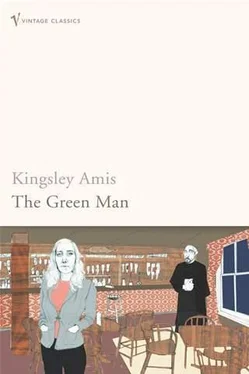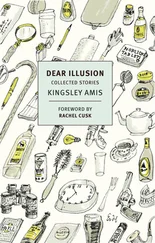Kingsley Amis - The Green Man
Здесь есть возможность читать онлайн «Kingsley Amis - The Green Man» весь текст электронной книги совершенно бесплатно (целиком полную версию без сокращений). В некоторых случаях можно слушать аудио, скачать через торрент в формате fb2 и присутствует краткое содержание. Жанр: Старинная литература, на английском языке. Описание произведения, (предисловие) а так же отзывы посетителей доступны на портале библиотеки ЛибКат.
- Название:The Green Man
- Автор:
- Жанр:
- Год:неизвестен
- ISBN:нет данных
- Рейтинг книги:5 / 5. Голосов: 1
-
Избранное:Добавить в избранное
- Отзывы:
-
Ваша оценка:
- 100
- 1
- 2
- 3
- 4
- 5
The Green Man: краткое содержание, описание и аннотация
Предлагаем к чтению аннотацию, описание, краткое содержание или предисловие (зависит от того, что написал сам автор книги «The Green Man»). Если вы не нашли необходимую информацию о книге — напишите в комментариях, мы постараемся отыскать её.
The Green Man — читать онлайн бесплатно полную книгу (весь текст) целиком
Ниже представлен текст книги, разбитый по страницам. Система сохранения места последней прочитанной страницы, позволяет с удобством читать онлайн бесплатно книгу «The Green Man», без необходимости каждый раз заново искать на чём Вы остановились. Поставьте закладку, и сможете в любой момент перейти на страницу, на которой закончили чтение.
Интервал:
Закладка:
Thornton devotes nearly three pages to Underhill in his chapter on ‘Magicians and Conjurors’, but the greater part of the passage concerns Underhill’s alleged reappearances in supernatural form during the century and a half or so after his death, together with an account of that other being said to have been heard making its rustling, crackling progress round the outside of the house after dark. The treatment of the murders and their aftermath is less full; through lack of time or sheer absence of surviving evidence, as opposed to just talk, Thornton failed to establish any tangible link between Underhill and the two unsolved killings, and had to be content with recording the strength and persistence of the tradition—among people in Baldock and Royston as well as in the surrounding hamlets—that the man had acquired the ‘mysterious and evil art’ of striking from a distance at those foolhardy enough to cross him, ‘of causing his victims to be torn to pieces by hands that were not mortal, so that a villager would not pass his house, by day no more than by night, for dread that the nefarious Doctor’s eye would light upon him and find in him a fresh object of fear or hate.’
With no clear idea of what I was looking for, I read inattentively through the four or five long paragraphs, or rather reread them for the dozenth time. Then, towards the end, I came to a couple of sentences I could not remember even having seen before:
‘… Such were the events attending the obsequies of this infamous creature, for such I hold him to have been at the least, whatever be the truth of the copious testimonies to his wizardry. His effects, whether by chance or by malignity, appear to have been dispersed: the greater proportion of his books and papers suffered destruction at a fire on his premises (for which I can find no cause adduced) the second day following his death; some small part, at his own request, was buried with his person; a fragment of a journal survives in the library of his college, All Saints’ at Cambridge. Of this relic it should be said, that it is not worth the pain of perusal, save by him whose curiosity in the manners of that still barbarous age may be sufficient to abate his natural aversion from the task.’
I thought I saw something faintly odd about the last part of this. Why should Thornton, normally keen to infect his readers with his own enthusiasms, to the extent of (perhaps too often) exhorting them to go and look up his sources for themselves, have mentioned this bit of journal, together with its location, and then warned them off taking the trouble to ‘peruse’ it? Well, any mystery here might easily be cleared up tomorrow. If that Underhill manuscript had been in the All Saints’ library in the early nineteenth century, there was a good chance that it was there still. Anyway, I was going to drive to Cambridge in the morning and find out. I could not have said why I was immediately so determined to do this.
Between the pages of the Superstitions concerned with Underhill, I used to keep a few papers relating to him that had ‘come with the house’, chiefly Victorian local-newspaper cuttings of no great interest, but including a statement made by a servant at an earlier period. In the past, I had dismissed this too as dull, and had not looked at it for four or five years, but now I felt it was important to me. I unfolded the stained, dry single sheet.
‘I, Grace Mary Hedger, chamber maid in the service of Samuel Roxborugh, Esquire, being xlix yrs of age, & a Christian, do solemly avouch and declare, that yesterday evening, the third day of March, Aº D. MDCCLX, at about v o clock, I enterd the little parlour [then part of what was now the public dining-room] about my tasks, & there saw a Gentleman standing near the window. His cloathes somwhat like the cloathes of old Rev dMr Millinship I saw when I was a young girl. His complection very pale, but scarrd w thred, his nose long & turnd to the side, his mouth like a woman’s. He apeard in distress of mind. When I asked him his pleasure he was there no longer, he did not quit the chamber, of a sudden he was not there. I was much affrighted & shreikd & swoond & my mistress came to me. I would not see such a Gentelman again for an hunderd poun. All this I swear.’
Grace Mary had added a careful signature and somebody called William Totterdale, rector of the parish, who had obviously written out the statement, had been a witness. Between them they had put my mind at ease, on one matter anyhow: the three accurately expressed facial details were enough on their own, without the reference to a kind of clerical garb to which the nearest parallel in Grace’s experience would have been what she remembered having seen an old clergyman wearing in the 1720s. I drank to her and blessed her for her powers of observation and recall.
Through no fault of hers, on the other hand, her service to me was limited. I could not tell Lucy or anyone else, including myself, that I had not read the affidavit before. It was possible—I disbelievingly supposed it to be just possible—that my earlier couple of readings had impressed the facts on some buried part of my mind, from which something had dredged them up to create an illusion. What that particular something might have been was in itself mysterious, because any thought of Underhill’s ghost I had about my mind at the time had also been pretty deeply buried, but that sort of problem is no problem in an unphilosophical age in which lack of total disproof is taken as the larger half of proof.
I had refolded Grace’s statement and was about to close the book on it and the other papers, when my eye fell on another passage of Thornton’s I had forgotten, more precisely on a single phrase in brackets in the middle of his account of the unseen nocturnal prowler: ‘which some suspect to have been the Doctor’s agent’. At once I saw what I should have seen earlier, or had seen without knowing what it was I saw. The witness who had disagreed about the expression on the face of Underhill’s ghost had not really disagreed at all: they had seen him as he had been in life at different times, separated perhaps by a matter of seconds. He had had a look of clinical curiosity as he waited to find out just what sort of creature he had conjured up out of the wood, and this look had changed to one of horror when it came into his view on its way to tear his wife or his enemy to pieces. And this creature, or its phantom, had somehow not been fully laid to rest at Underhill’s death, had from time to time tried to find its way into its former controller’s house-—for further instructions? And it had made the sound of moving branches and twigs and leaves as it walked because that was what it consisted of. And if I had been able to wait long enough in the copse that afternoon, I would have seen it too; it, or its phantom.
The whole left half of my body, including arm and leg, shook emphatically to and fro four times. My immediate thought was that I had now started to experience jactitation while fully conscious, and this filled me with fear, until I realized that I had merely shivered from fear, the double fear I had already felt at lunch-time, fear both of what had come into my mind and of the fact that it had done so and was going to stay there. I did not know anybody well enough, I could not imagine anybody knowing anybody well enough, to be able to tell him or her a tale like this. Perhaps I would have found this a less unlikely concept if I had not recently passed from being a notorious drunk to being a notorious drunk who had begun to see things, but I doubt it. Anyway, I was going to have to deal with this myself, without any clear idea of what this was or what dealing with it would entail. Thought was going to be necessary: that much could be glimpsed. I tried to do some thinking now, and got to the point of perceiving that the reason why Thornton had found no clear link, almost no link at all, between Underhill and the wood creature was that he had never visited the copse (or, if he had, whatever conditions had been operating six hours ago had been absent then). That was the farthest I could go for the moment. I felt I had had enough of my own company for a bit, whatever the disadvantages of swelling the number. I went to the bathroom, washed briefly, threw some after-shave lotion round my face to vie the fumes of whisky and set off down to the bar.
Читать дальшеИнтервал:
Закладка:
Похожие книги на «The Green Man»
Представляем Вашему вниманию похожие книги на «The Green Man» списком для выбора. Мы отобрали схожую по названию и смыслу литературу в надежде предоставить читателям больше вариантов отыскать новые, интересные, ещё непрочитанные произведения.
Обсуждение, отзывы о книге «The Green Man» и просто собственные мнения читателей. Оставьте ваши комментарии, напишите, что Вы думаете о произведении, его смысле или главных героях. Укажите что конкретно понравилось, а что нет, и почему Вы так считаете.











